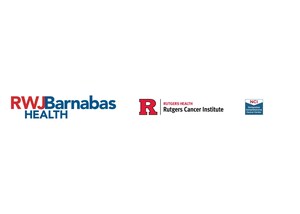Rutgers Cancer Institute and RWJBarnabas Health to Unveil Pioneering Blood Cancer Research at the 66th American Society of Hematology Annual Meeting and Exposition
The institution will highlight its latest advancements in hematology and oncology through 66 oral and poster presentations
NEW BRUNSWICK, N.J., Dec. 4, 2024 /PRNewswire/ -- Physician-scientists from Rutgers Cancer Institute and RWJBarnabas Health will showcase a diverse range of hematology/oncology data from their clinical research program at the 66th American Society of Hematology (ASH) Annual Meeting and Exposition, being held in San Diego, California (and online) from December 7-10, 2024. A total of 66 abstracts have been accepted (including 21 oral presentations, 39 poster presentations, 1 special-interest session, 1 oral symposium, 2 satellite symposia and 2 scientific workshops), comprising of clinical data and analyses that advance the understanding, treatment, and prognosis of blood cancers and disorders such as sickle cell disease, lymphoma, leukemia, and myeloma. Rutgers Cancer Institute, together with RWJBarnabas Health, is New Jersey's only National Cancer Institute-designated Comprehensive Cancer Center.
"At the heart of our research efforts is a commitment to improving patients' lives and serving our community. This promise is shared by our nationally recognized team of cancer specialists, who work tirelessly to translate groundbreaking discoveries into the best options for our patients," said Matthew Matasar, MD, Chief, Division of Blood Disorders, Rutgers Cancer Institute, and Professor of Medicine, Rutgers Robert Wood Johnson Medical School. "The impressive contributions of our faculty, showcased at this year's ASH Annual Meeting, underscore the clinical excellence, innovation, and discovery that define Rutgers Cancer Institute and RWJBarnabas Health. We're proud to lead cutting-edge research that has the potential to improve the lives of every patient and family we serve. We remain singularly focused on my, and our, goal to end blood cancers and disorders entirely."
Highlights of the high-impact science from Rutgers Cancer Institute at ASH 2024:
- Data from a study that leverages big data to improve prognostication in advanced stage classic Hodgkin Lymphoma (cHL). This study, which analyzed 1,240 patients, used multistate modeling (MSM) and individual patient data from the HoLISTIC Consortium to refine prognostication across the cHL disease course, through specifically assessing the relationships between Advanced Stage Hodgkin Lymphoma International Prognostication Index (A-HIPI), interim PET (iPET) and end of treatment (EOT) response, and whether the A-HIPI and iPET provide independent prognostic information.
- Researchers examined the bispecific antibody linvoseltamab in patients with relapsed/refractory multiple myeloma (RRMM), assessing longer follow-up and a select high-risk subgroup analysis of the Linker-MM1 study. Additional analyses were conducted to evaluate the effectiveness of linvoseltamab, focusing on how long patients responded to treatment (duration of response), how long they remained free from disease progression (progression-free survival), and their overall survival. These results, based on a safety follow-up period of over 14 months, were specifically looked at in high-risk patient groups.
- A primary analysis from the ELM-1 expansion cohort, evaluated the efficacy and safety of the bispecific antibody odronextamab monotherapy in patients with diffuse large b-cell lymphoma (DLBCL) who had disease progression after CAR T-cell therapy. The primary endpoint was objective response rate, as assessed by independent central review according to the Lugano classification. The key secondary endpoints included duration of response, progression-free survival, and overall survival. Exploratory endpoints included immune biomarker assessment.
- A study leveraging real-world evidence compared the overall survival associated with different treatment sequences in patients with chronic lymphocytic leukemia/small lymphocytic lymphoma (CLL/SLL) in the United States. The study used an electronic health record database from Flatiron Health to identify adult patients with CLL or SLL who started treatment in 2016 or later and had received at least two lines of therapy.
- An evaluation of CAR-HEMATOTOX scoring as a predictor of infection risk following treatment with odronextamab in relapsed/refractory (R/R) diffuse large b-cell lymphoma (DLBCL) and in follicular lymphoma (FL). These retrospective analysis of the ELM-1 and ELM-2 studies evaluated infections in 219 patients receiving odronextamab monotherapy for R/R DLBCL and FL, respectively.
The full list of presentations at this year's American Society of Hematology (ASH) Annual Meeting and Exposition can be found here.
About Rutgers Cancer Institute
As New Jersey's only National Cancer Institute-designated Comprehensive Cancer Center, Rutgers Cancer Institute, together with RWJBarnabas Health, offers the most advanced cancer treatment options, including bone marrow transplantation, proton therapy, CAR T-cell therapy and complex surgical procedures. Along with clinical trials and novel therapeutics such as precision medicine and immunotherapy – many of which are not widely available – patients have access to these cutting-edge therapies at Rutgers Cancer Institute in New Brunswick, Rutgers Cancer Institute at University Hospital in Newark, as well as through RWJBarnabas Health facilities.
For journalists – contact:
Krista Didzbalis
Corporate Communications Specialist, Strategic Communications, RWJBarnabas Health
732.507.8307
[email protected]
For patient appointments/inquiries – contact:
844-CANCERNJ (844-226-2376)
SOURCE Rutgers Cancer Institute and RWJBarnabas Health

WANT YOUR COMPANY'S NEWS FEATURED ON PRNEWSWIRE.COM?
Newsrooms &
Influencers
Digital Media
Outlets
Journalists
Opted In





Share this article